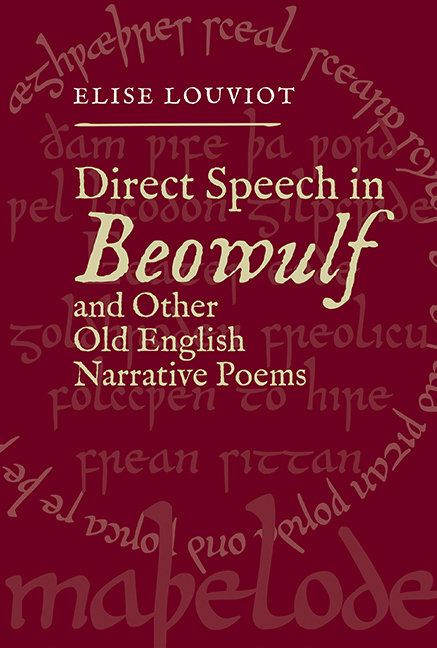Book contents
- Frontmatter
- Contents
- List of Figures
- Acknowledgements
- Introduction
- 1 The Form of Direct Speech
- 2 The Content and Context of Direct Speech
- 3 A Lack of Subjectivity?
- 4 Archetypal Subjectivity
- 5 A Problem with Voices
- 6 A Problem with Point of View
- 7 Impossible Irony
- Conclusion
- Bibliography
- Index
- Anglo-Saxon Studies
1 - The Form of Direct Speech
Published online by Cambridge University Press: 05 June 2016
- Frontmatter
- Contents
- List of Figures
- Acknowledgements
- Introduction
- 1 The Form of Direct Speech
- 2 The Content and Context of Direct Speech
- 3 A Lack of Subjectivity?
- 4 Archetypal Subjectivity
- 5 A Problem with Voices
- 6 A Problem with Point of View
- 7 Impossible Irony
- Conclusion
- Bibliography
- Index
- Anglo-Saxon Studies
Summary
Few rhetorical devices are more alien to Old English poetry than stychomythia, the fast alternation of one-line speeches to achieve maximum dramatic intensity. As noted by earlier critics, Old English speeches are typically long and undramatic. While there is no reason to question the validity of that statement, it is necessary to go beyond such a general claim in order to understand why Old English poets favoured a convention so blatantly opposed to our modern taste. It is particularly worth investigating to what extent Old English poems differ from other early medieval texts in that respect and whether there are some occasions when Old English poets do strive for more vivacity. This chapter examines both the structure and the marking of Direct Speech in the eight poems of the main corpus – Genesis A and B, Christ and Satan, Guthlac A, Juliana, Andreas, Elene and Beowulf – to attempt to understand the framework in which Old English poets worked.
Structure
Speech Lengths
The structure of Direct Speech in Old English poetry seems to be deliberately designed to hamper interaction. First of all, it is clear that relatively long speeches are the norm for all poems. It is especially true for the speeches of Beowulf, Genesis B and Guthlac A, which show average lengths above twenty-five lines and median lengths around twenty. The other poems show lower figures, with an average length between eleven (Genesis A) and sixteen (Elene) lines and a median between six (Christ and Satan) and ten (Andreas and Juliana). The import of that discrepancy should not be overstated as figures may vary considerably within the same text and, as such, a limited sample cannot have any statistical significance. Still, there might be a correlation between relatively shorter speeches and a greater Latin influence, as most of the texts in the second group are translations from the Latin.
The likelihood of that hypothesis is strengthened by the fact that speeches are usually even more concise in the Latin sources than in the Old English verse translations. Concerning Genesis A, Elene and Juliana, almost all speeches are longer in Old English than in the original and more than half are at least twice as long.
- Type
- Chapter
- Information
- Publisher: Boydell & BrewerPrint publication year: 2016



